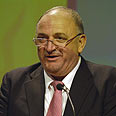
Tshuva: I'll gladly help Lebanon search for gas
Billionaire dismisses Lebanese claim to natural gas his group found in Mediterranean, but says seismographic tests indicate there is large amount of gas in northern neighbor's territorial waters. Finance minister: All Israelis should profit from finds
Lebanon can benefit from the discovery of off-shore gas fields in its territorial waters, billionaire Yitzhak Tshuva told some 4,000 haredi businessmen in Jerusalem last Thursday during a conference sponsored by the Hamodia daily.
Noble Energy Inc. and Israeli companies controlled by Tshuva have announced two finds in the past year-and-a-half that may hold 24 trillion cubic feet of gas. Lebanese officials have said the gas may extend into the country's waters.
Israel’s National Infrastructure Ministry said the finds, Leviathan and Tamar, lie about 130 kilometers (81 miles) and 90 kilometers, respectively, off Israel in the Mediterranean Sea. Delek Drilling-LP, one of the fields’ partners, said recently that the licenses are in waters where Israel has authority.
"If there is gas within Lebanon's territory, we will be willing to share with them (Lebanese authorities) all the information we have regarding the search for natural gas in exchange for real peace," Tshuva told the conference.
He reiterated that Leviathan and Tamar were in Israeli territory alone, despite Lebanon's claims to the contrary. "There is no argument over the fact that the finds are in Israeli territory, but seismographic data indicate there is a large amount of gas in Lebanese territory as well," Tshuva said.
A senior source in Delek, which is controlled by Tshuva, said, "Obviously, our group has not conducted seismographic tests in Lebanese territory, but tests conducted in Israeli territory showed there is natural gas within Cyprus and Lebanon's territorial waters.
"The group has already signed a contract to produce gas in Cyprus, and we can sign a similar agreement with Lebanon – under peaceful conditions," said the source.
The conflict between Israel and Lebanon over the natural gas reserves has led to threats of violence from both sides.
Israeli and Lebanese maps of the Mediterranean Sea are not coordinated. For example, Lebanese maps indicate Israel's northern border stretches west of Rosh HaNikra grottoes whereas Israeli maps mark it west of Metula.
During the conference, Tshuva also addressed the entrepreneurs' dispute with the Finance Ministry regarding the amount of royalties the state is entitled to. "Every Israeli citizen will benefit from the gas reserves, but those who are trying to constrain the entrepreneurs may hurt the economy," he said.
Finance Minister Yuval Steinitz, who has set up a committee tasked with determining whether the amount of royalties the gas companies are obligated to pay the government is sufficient, recently said, "The Land of Israel belongs to the people of Israel, and the profits from the (natural) resources should be distributed among all citizens."
"We are in favor of the free market and profits for entrepreneurs, but the profit margin must be reasonable and match the existing standards in the West," the finance minister added.










